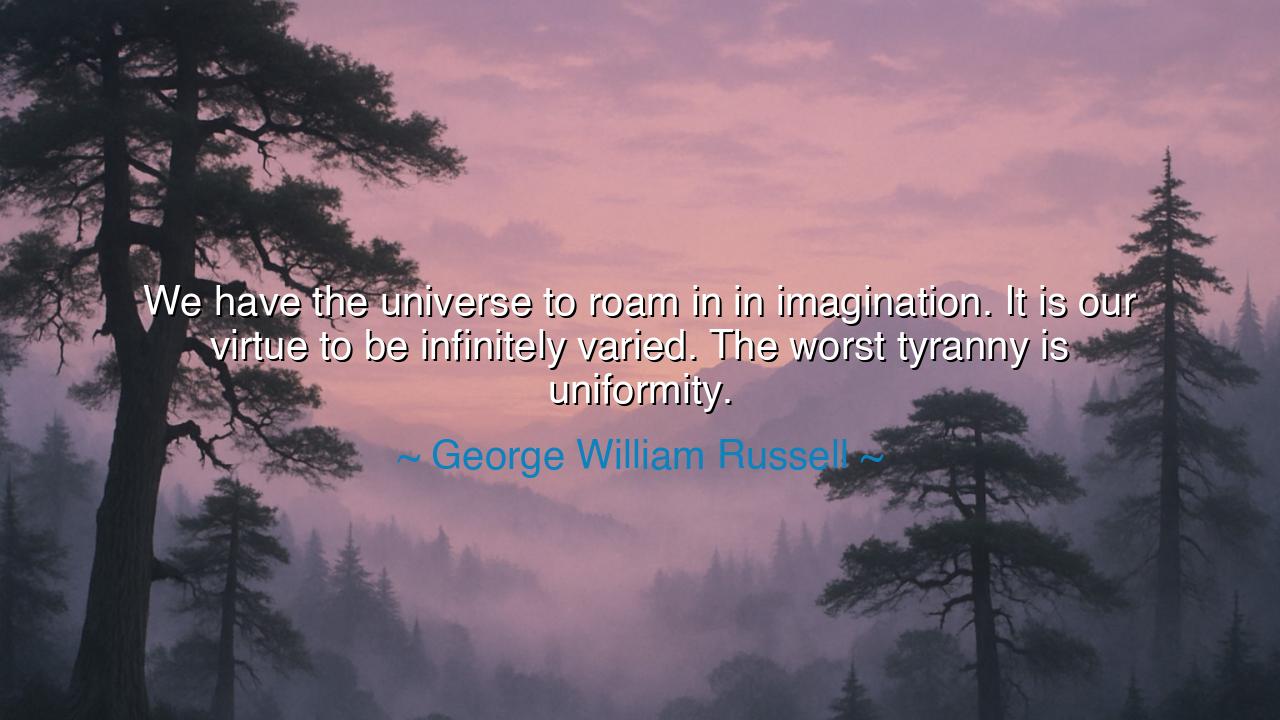
We have the universe to roam in in imagination. It is our virtue
We have the universe to roam in in imagination. It is our virtue to be infinitely varied. The worst tyranny is uniformity.






“We have the universe to roam in in imagination. It is our virtue to be infinitely varied. The worst tyranny is uniformity.” — thus declared George William Russell, the Irish mystic, poet, and philosopher known as Æ, whose spirit burned with the vision of freedom both inward and divine. In these words lies a truth vast as the stars themselves — a truth about the boundless nature of the human imagination, the sacred dignity of individuality, and the silent danger of conformity. Russell’s cry is both a hymn to the creative spirit and a warning against the dull prison of sameness. He reminds us that the human soul was made not to repeat, but to roam, to invent, to differ, and to shine in its own color amidst the light of the cosmos.
The origin of this thought rises from the heart of Ireland’s great cultural awakening in the late nineteenth and early twentieth centuries. Russell was a central figure in the Irish Literary Revival, a movement that sought to reclaim the imagination of a nation long shackled by colonial rule and spiritual weariness. Alongside W.B. Yeats, he envisioned a rebirth of myth, art, and identity — not through weapons or politics, but through the imagination, that inner realm where the spirit cannot be conquered. It was in this struggle that Russell came to see uniformity — the crushing of difference, the dulling of creativity — as the worst tyranny of all. For he understood that true freedom begins in the mind, and that no empire can enslave a soul that dares to dream.
In his vision, imagination is not an idle fancy but a divine inheritance. It is the force that allows humanity to transcend its limits, to roam the universe in thought and spirit, to explore the infinite even while bound to the earth. Russell believed that imagination connects us to the eternal — to the unseen patterns that weave the fabric of reality. Through imagination, we become creators, participants in the unfolding of existence itself. But when imagination is silenced, when the world demands sameness of thought, dress, or desire, the spirit withers. To conform blindly is to betray the very essence of what it means to be human.
Consider, for example, the story of Galileo Galilei, who in an age ruled by dogma dared to imagine the heavens anew. Against the rigid uniformity of accepted truth, he envisioned a universe in motion — a cosmos not centered on man, but alive with wonder. For this act of imagination, he was condemned and silenced. Yet his vision endured, for no power on earth can imprison the mind that sees beyond its chains. Russell’s words echo through such stories — through every artist, thinker, and rebel who has refused to bow to the tyranny of sameness. They remind us that the progress of civilization is nothing less than the victory of imagination over fear.
Russell’s idea of being “infinitely varied” is not merely a celebration of difference for its own sake; it is a recognition that diversity is the very breath of life. Nature herself teaches this lesson. The forest thrives not through uniformity, but through abundance and variation. Every tree, every leaf, every ray of sunlight differs — and in that difference, harmony is born. So too with humanity. Each mind, each voice, each dream adds a note to the symphony of existence. The attempt to impose uniformity — whether by state, creed, or culture — is an act of violence against the soul of the world. It is a tyranny, not of swords, but of silence.
In his mystical writings, Russell often described the universe as alive with consciousness, a boundless sea of thought where every being contributes to the divine whole. To roam that universe in imagination is to awaken to our kinship with all creation. It is to live as explorers of truth and beauty, rather than as prisoners of habit. When he warns of uniformity, he warns against forgetting this cosmic birthright — against letting our minds grow narrow when they were meant to hold galaxies. The virtue of the human spirit, he insists, is its endless capacity for renewal, for variation, for transformation.
And so, the lesson of Russell’s words is clear: guard your imagination as you would guard your freedom. Do not let the noise of the world drown the song within you. Resist the pressure to conform — in thought, in art, in the quiet decisions of daily life. Celebrate difference, for it is the pulse of creation. Let your imagination wander fearlessly across the universe, finding wonder where others see only walls. The tyrannies of the world begin when minds grow uniform, when imagination is traded for obedience.
Thus, remember the wisdom of George William Russell: that the mind unchained is vaster than any empire, and the soul that imagines freely is already immortal. To live imaginatively is to live as a creator, to bring color to a gray world, to uphold the sacred truth that no two stars — nor two souls — were ever meant to shine the same. For it is our infinite variety that makes us divine, and our courage to imagine that keeps the universe alive.






AAdministratorAdministrator
Welcome, honored guests. Please leave a comment, we will respond soon